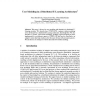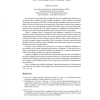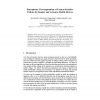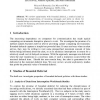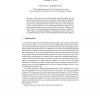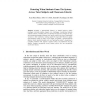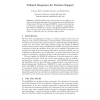UM
2005
Springer
14 years 5 months ago
2005
Springer
Abstract. We propose an approach for modeling the navigational behavior of Web users based on task-level patterns. The discovered “tasks” are characterized probabilistically as...
UM
2005
Springer
14 years 5 months ago
2005
Springer
Abstract: This paper is focused on user modeling and adaptation in distributed ELearning systems. We describe here CUMULATE, a generic student modeling server developed for a distr...
UM
2005
Springer
14 years 5 months ago
2005
Springer
UM
2005
Springer
14 years 5 months ago
2005
Springer
Inference and decision making with probabilistic user models may be infeasible on portable devices such as cell phones. We highlight the opportunity for storing and using precomput...
UM
2005
Springer
14 years 5 months ago
2005
Springer
We review experiments with bounded deferral, a method aimed at reducing the disruptiveness of incoming messages and alerts in return for bounded delays in receiving information. Bo...
UM
2005
Springer
14 years 5 months ago
2005
Springer
Adaptive information systems typically exploit knowledge about the user’s interests, preferences, goals etc. to determine what should be presented to the user and how this presen...
UM
2005
Springer
14 years 5 months ago
2005
Springer
Building a generalizable detector of student behavior within intelligent tutoring systems presents two challenges: transferring between different cohorts of students (who may devel...
UM
2005
Springer
14 years 5 months ago
2005
Springer
Stereotypes and clustering are some techniques for creating user models from user behavior. Yet, they possess important risks as users actions could be misinterpreted or users coul...
UM
2005
Springer
14 years 5 months ago
2005
Springer
Abstract. Individuals di er in the resources that they are willing to expend on information gathering and on the importance of di erent kinds of information. We have developed MADS...
UM
2005
Springer
14 years 5 months ago
2005
Springer
We present a computational framework designed to provide adaptive support aimed at triggering learning from problem-solving activities in the presence of worked-out examples. The k...

